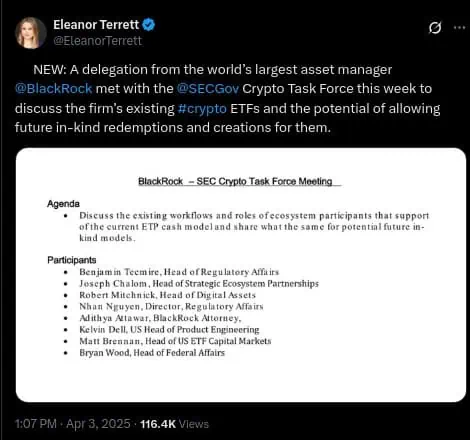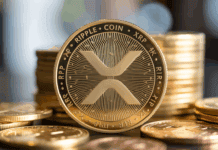
The SEC and BlackRock are holding crucial meetings to define the regulatory future of cryptocurrency ETFs, addressing key issues such as in-kind redemptions and staking, as applications for new crypto-asset products grow.
According to several reports, the discussions cover critical aspects such as the in-kind repayment model and staking, key elements for the development of these financial products.
For experts, the holding of these meetings is a clear indication that the SEC is actively working to create a regulatory framework that allows for innovation in the digital asset space without compromising investor protection. The federal agency, which regulates the securities market, is at a crucial juncture, seeking to balance the promotion of financial innovation with the need to safeguard investors in an emerging and volatile market like the cryptoasset market.
LINK CARD AND EARNSEC and BlackRock: A key dialogue to regulate crypto ETFs
The cryptocurrency ETF landscape is at an inflection point. The SEC, under the Donald Trump administration, is facing industry pressure to approve new products that offer investors more diversified exposure to cryptocurrencies. However, the regulatory agency must carefully evaluate the risks associated with these products, including market volatility, digital asset custody, and the potential for market manipulation. The meetings with BlackRock and the ICC represent an important step in this process, allowing the SEC to gather information and perspectives from key industry players.

These meetings also suggest that the SEC is seeking clear rules for cryptocurrency-based ETFs. Experts note that the federal agency is materializing its innovation efforts at these meetings, as discussions of topics such as redemption mechanisms and the feasibility of including staking underscore its openness to innovation in the cryptoasset space.
First, in-kind redemptions are a model that would allow authorized participants to exchange ETF shares directly for the fund's underlying asset, such as Bitcoin, instead of cash. Therefore, it is a model that could improve efficiency and reduce the costs associated with these financial products. BlackRock is one of the entities that has proposed incorporate this redemption model into its Bitcoin ETF, iShares Bitcoin Trust (IBIT).
BUY BITCOINMeanwhile, the SEC is discussing staking within cryptocurrency ETFs, a process that involves staking tokens into the network to ensure its operation and earn rewards.
These discussions signal a growing openness of the federal agency toward crypto innovation, as long as certain investor protection standards are met.
The number of cryptocurrency ETF applications is increasing.
The SEC's work clarifying rules for cryptocurrencies and digital assets coincides with a surge in applications for new exchange-traded products based on these crypto assets, including the most capitalized and popular ones, such as Solana, Cardano, Avalanche, Dogecoin, TRUMP, and others.
This growing interest reflects the maturation of the cryptocurrency market and investors' appetite for access to these assets through regulated investment vehicles. However, the approval of ETFs based on cryptocurrencies other than Bitcoin and Ethereum poses additional challenges for the SEC, requiring the agency to carefully evaluate the liquidity, custody, and valuation of these assets, as well as the risks associated with their respective protocols.
Towards crypto regulation
Over the past three months, the SEC has intensified its efforts to provide regulatory clarity to the crypto industry. In addition to the recent reported meetings with BlackRock and the Crypto Council, the agency has participated in various initiatives to address the regulatory need for this emerging market. The SEC has established a cryptoasset-focused working group, which is holding roundtable discussions focused on critical topics such as cryptocurrency trading, asset custody, tokenization of real-world assets, and regulatory innovation in DeFi.
GO TO BIT2ME LIFEFurthermore, the SEC has taken significant steps to reestablish its relationship with the crypto industry, including withdrawing lawsuits against companies such as Uniswap, Consensys, Opensea, and Ripple, suggesting a more favorable approach toward the sector as a whole. Experts believe these actions reflect a shift in the SEC's stance, seeking a more cohesive and less restrictive regulatory framework for cryptocurrencies in the country.
Therefore, the recent meetings between the SEC, BlackRock, and the Crypto Council mark a significant step toward market maturity in the United States and in the pursuit of regulatory clarity for better cryptocurrency ETF operations. The potential inclusion of in-kind redemptions and staking could foster greater investor confidence and adoption while promoting responsible innovation.
These efforts by the SEC to establish a clear and transparent regulatory framework are considered essential to ensuring investor protection and the sustainable development of the digital asset industry.
Investing in cryptoassets is not fully regulated, may not be suitable for retail investors due to high volatility and there is a risk of losing all invested amounts.



